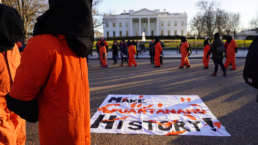Guantanamo, a prison built for those detained in America’s never-ending Global War on Terror, has been open for almost 21 years. Will America’s forever prison finally close?
By Karen J. Greenberg, TomDispatch
As of December 8, 2022, Guantánamo Bay detention facility — a prison offshore of American justice and built for those detained in this country’s never-ending Global War on Terror — has been open for nearly 21 years (or, to be precise, 7,627 days). Thirteen years ago, I published a book, The Least Worst Place: Guantanamo’s First 100 Days. It told the story of the military officers and staff who received the prison’s initial detainees at that U.S. naval base on the island of Cuba early in 2002. Like the hundreds of prisoners that followed, they would largely be held without charges or trial for years on end.

Ever since then, time and again, I’ve envisioned writing the story of its ultimate closure, its last days. Today, eyeing the moves made by the Biden administration, it seems reasonable to review the past record of that prison’s seemingly never-ending existence, the failure of three presidents to close it, and what if anything is new when it comes to one of the more striking scenes of ongoing injustice in American history.
The Beginning
When, in January 2002, those first planes landed at Guantánamo (which we came to know as Gitmo), the hooded, shackled, goggled, and diapered prisoners in them were described by the Pentagon as “the worst of the worst.” In truth, however, most of them were neither top leaders of al-Qaeda nor, in many cases, even members of that terrorist group. Initially housed at Camp X-Ray in open-air cages without plumbing, dressed in those now-iconic orange jumpsuits, the detainees descended into a void, with little or no prison policies to guide their captors. When Brigadier General Michael Lehnert, the man in charge of the early detention operation, asked Washington for guidelines and regulations to run the prison camp, Pentagon officials assured him that they were still on the drawing board, but that adhering in principle to the “spirit of the Geneva Conventions” was, at least, acceptable.
Recent Posts
Feeding The Warfare State
July 1, 2025
Take Action Now We Lose, the Weapons Makers WinBy William D. Hartung, Tom Dispatch The Senate is on the verge of passing the distinctly misnamed…
The Rage Of Billionaires And The Frenzy To Stop Zohran Mamdani From Becoming New York’s Mayor
June 30, 2025
Take Action Now The constellation of forces now regrouping with a vengeance includes titans of Wall Street, enormous real estate interests,…
It’s Not Just The Cities. Extreme Heat Is A Growing Threat To Rural America.
June 28, 2025
Take Action Now The urban heat island sits in a rural heat ocean.By Umair Irfan, Vox Summer has officially begun with a blast of scorching…
Mamdani’s Massive Victory Should Show Democrats Where The Party’s Future Lies
June 27, 2025
Take Action Now NYC mayoral candidate Zohran Mamdani has thrown the drowning Democratic Party a life vest. Will its leaders use it?By Sam…




